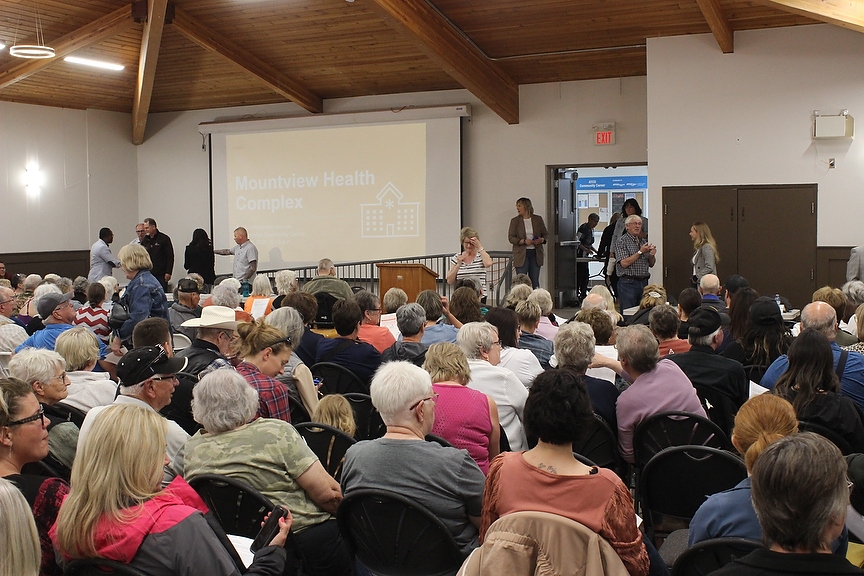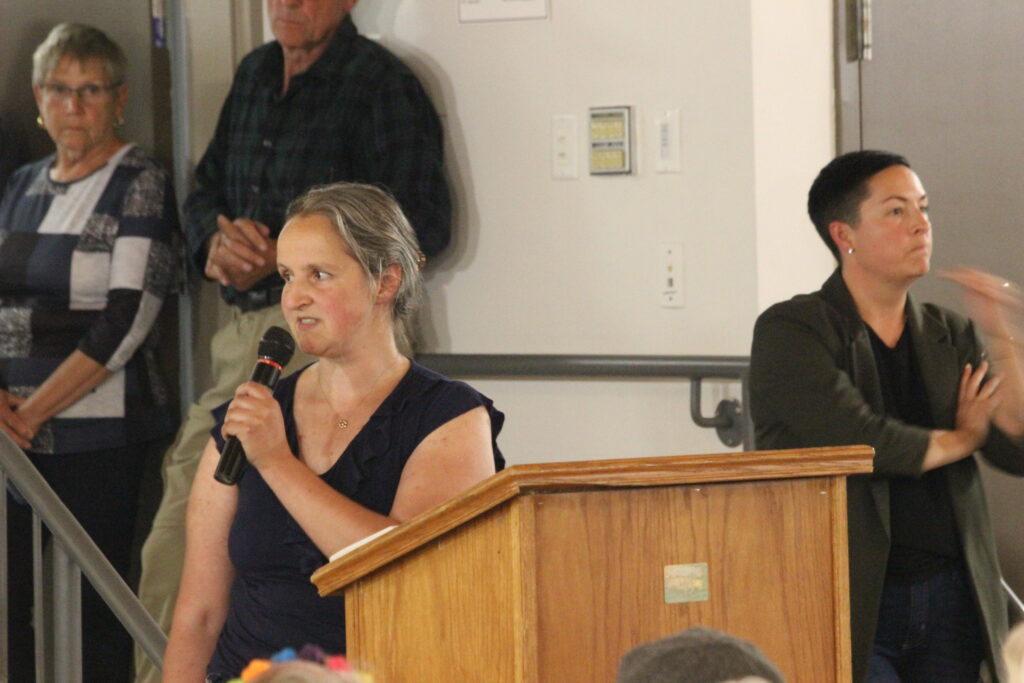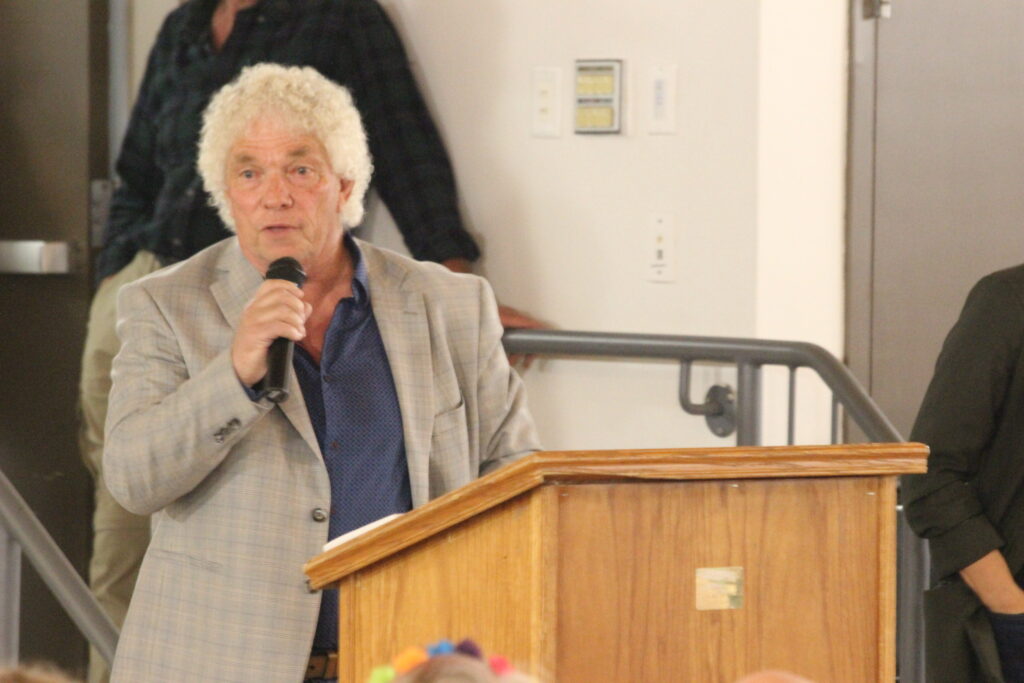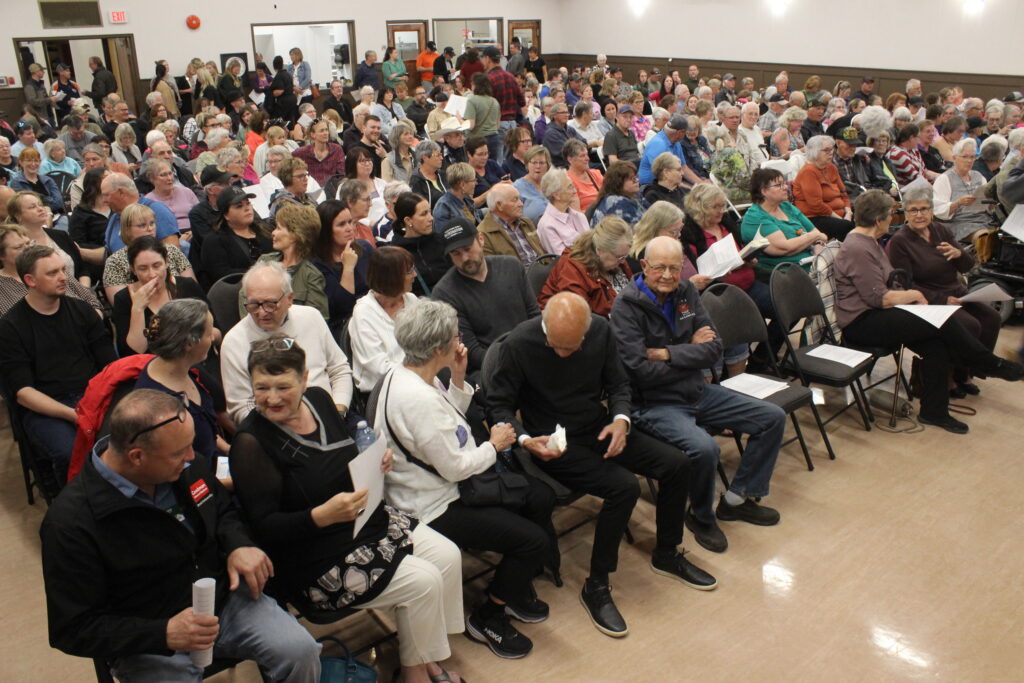
A vocal standing-room-only crowd was demanding answers in Beaverlodge last week when it learned the replacement for the aging hospital will not include a 24-hour emergency department (ED).
Instead, Alberta Health Services (AHS) senior operating officer Sandra Herrit told session attendees the complex will operate as a 16-hour Advanced Ambulatory Care Centre (AACC). Patients will receive pre-hospital care and transport as required to Grande Prairie Regional Hospital (GPRH) after-hours.
“Physicians will not work in an AACC,” said Dr. Camellia Presley, a Beaverlodge physician. “Zero doctors have agreed to this.”
She said the three local physicians who work at the Beaverlodge Municipal Hospital (BMH) ED will leave.
“That leaves me,” she said. “I’m not going to work 16 hours, it’s not going to happen.”
Herrit said the complex will have 32 lower acuity beds and wraparound services, including physio/occupational therapy, public health, social work and pharmacy.
“It will be a one-stop shopping experience.”
She said the decision to remove an ED was made as lower acuity beds “aligned with the needs of the population.”

Presley sounded the alarm on June 18. After she learned about the plans at a Mountview physician engagement session, she posted to social media that the hospital would not be replaced.
She is concerned about the AACC’s impact on health care in West County.
Presley, who is also in charge of ED doctor scheduling in Beaverlodge, said current ED closures are due to supply.
“I keep losing doctors. (Dr.) Van would be here today if we hadn’t been told this was coming,” she said at the session.
“Once we lose the medical community I don’t know if we can get it back.”
Dr. Chantelle Scrutton told the session that “as soon as ED is removed, it impacts AHS ability to recruit for this community.”
When “you implement a site that doesn’t meet AHS contract requirements, you compromise a community’s access to health care which is already dire.”
Doctors Zenner and Duta also spoke out against the AACC model.
“If I can’t practice full scope I won’t stay here,” said Zenner. He noted he was born and raised in Grande Prairie and the news Beaverlodge would lose an ED is “a kicker”.
Beaverlodge Mayor Gary Rycroft was called on to answer to the fact the community had not been made aware of the loss of the ED.
“We were told we could not share info,” said Rycroft. “We have a thick book called the (Municipal Government Act) that tells us to be truthful and transparent, then we’re told we can’t tell anybody.
“We wanted this (info session) about two years ago, we should have had more public consultations, but our feet were tied,” said the mayor.

Rycroft told the News after the session he learned about the loss of the ED “six to eight months ago.”
While the town has since lobbied the province, Rycroft said the model will not change until the building is completed.
“If the current hospital goes away because of a roof collapse or leak and we don’t have a new one in place, we won’t get anything,” he said.
He noted it’s the same build for 16 hours of emergency care as it would be for 24 hours.
“We won’t have to build another building or add another room for that extra eight hours,” Rycroft said. “All you’ve got to do is add the equipment and the policies.”
“A rural ED has to have a doctor available wherever and whenever,” said Presley.
“They can stabilize the patient and transport out to Grande Prairie or Edmonton or wherever.
“We are not a trauma facility because we don’t have surgery. (Those cases go to the) higher level of care at GPRH, but a rural 24/7 ED exists in Peace River, Spirit River, High Level and Fox Creek and that is what our facility should be compared to, not Grande Prairie.”
Presley referred to data brought forward at the session by AHS which indicated 76 per cent of local residents use the BMH’s ED, a decline of nine per cent in the last 10 years at an average of one to two visits per night to the emergency room.
Eighty-five per cent of those visits did not require immediate interventions, according to AHS.
AHS also indicated that over the last 15 years, inpatient volume at the BMH has decreased by 50 per cent.
Presley said that admitting new patients requiring acute care has been difficult. “We are chronically blocked by long-term-care patients.”
“If we can’t move patients, we can’t admit people to our ED,” she said.
The top five reasons for admission in Beaverlodge according to AHS data are obstructive pulmonary disease, convalescence and pneumonia.
The full-spectrum offered in a full-time rural ED is compelling to physicians and critical in continuing to serve as a teaching centre for many resident doctors, Presley said.
The $170 million Mountview Health Complex (MHC) was announced in December 2023.
Indeed, all communication from the town and Alberta Health to date is that the new facility would offer all the services of the current hospital.
In October 2021, Rycroft told the News Mountview “will be doing everything this hospital is now.”
Rycroft noted getting the Beaverlodge health complex onto a budget line was an accomplishment,
“Everything has to line up,” he said. “We had the right people in the right place at the right time, and those things are all different now.”
Dr. Crow, former chief of staff of the BMH and long-time physician based in Hythe, urged the session attendees to use the new facility once it is built.
“They say they will look at changing the model, so show them the demand and use the facility.
“We’ve been lucky, training doctors here for over 30 years, and we can sign more if we get a full-spectrum facility,” said Crow. He noted that with the new medical program at Northwestern Polytechnic will add 30 new doctors starting in 2029.
“They will start training in 2025, and (Beaverlodge) will be part of that training tradition, taking at least 15 per cent of that training every year.
“If we show them good rural practice they will stay.”

Presley received a standing ovation from the audience with her statement that “if it’s not going to be a hospital, why can’t it be a 24-hour urgent care facility?”
The urgent care model is unscheduled health care offered as part of emergency department care or in ambulatory settings, for acute lower-acuity conditions. Urgent care services are provided by primary care providers such as general practitioners, nurse practitioners, physician assistants, or other professionals such as paramedics with advanced training.
AHS’ Herrit conceded some ground, hours into the session. “Let’s have that conversation, maybe (we can) proceed with an Urgent Care Centre … it’s not an ED and it’s not AACC but it may be a better reflection … that gives us the capacity to go 24/7”. She added she was “making no guarantees.”
Presley said two independent cost analyses conducted over the last month determined the cost to add an ED would be approximately $50 million.
Beaverlodge chief administrative officer Jeff Johnston told the session the $50M price tag was untenable. “The project is being funded through the AHS lease. There’s no way we can get the money. That’s the reality of it.”
With construction set to start by fall, locals say they are angry with the news they will be losing their rural ED.
Judy Carrell told the session she worked night shift at a convenience store in Beaverlodge for a number of years.
“People from (Grande Prairie) are coming here, Wembley are coming here,” she said. “Now you want us to go to (Grande Prairie).” She questioned AHS data presented at the session, wondering how many patients served in Beaverlodge ED come from further afield.
A concerned Kay Rawlyk addressed the session. “The first hospital in Beaverlodge is still there, a little log cabin. We built that, it’s ours. We built the second one. Now all of a sudden they’re going to take it away.
“How many of us have gone to (Grande Prairie) and waited 10 hours? They don’t have the people to support what they’ve got now.”
Meantime, Dr. Presley said she is hopeful AHS with engage further with local doctors.
“(The public) came in and asked hard questions and they made good comments.
This meeting should have happened a long time ago. And I’m so grateful for people that care enough to come out and actually fight for us.”
For Rycroft, he hopes the current slate of doctors will give the new facility a chance.
“I hope the doctors who said they won’t stay, I hope they will reconsider,” he said.
“The town has been going to bat for them, the community has to go to bat, start a letter writing campaign to the ministry and AHS to give them a different opinion of what’s going on.”
Rycroft said he anticipated another community meeting to take place this fall.
Around 350 people attended a public information session facilitated by the Alberta Health, AHS, the Town of Beaverlodge and Landrex Inc.
The session, scheduled for 6 to 8 p.m. ran on to close to 11 p.m., illustrated the frustration of residents who had been promised a hospital.
The Beaverlodge Municipal Hospital was built in 1956 and is the oldest AHS-operated site and the second oldest hospital in the province.